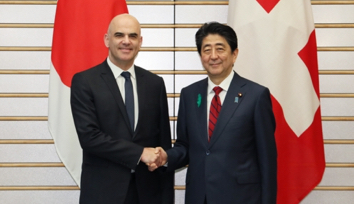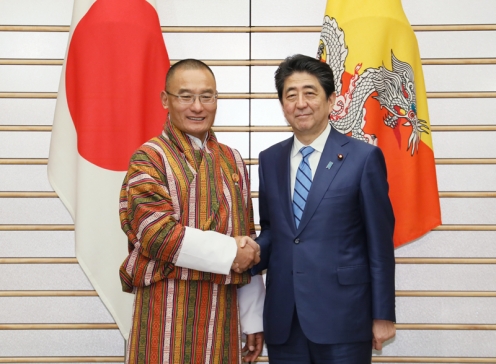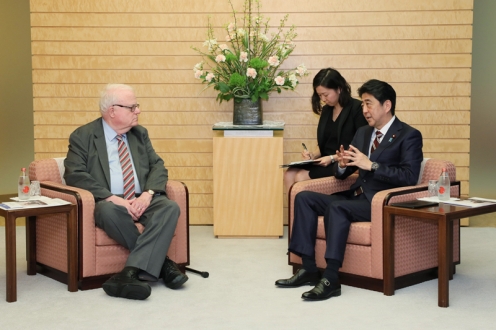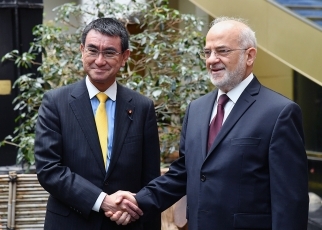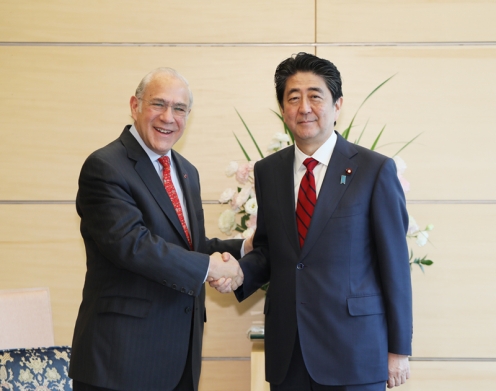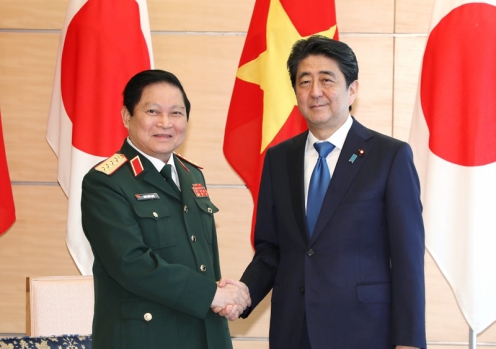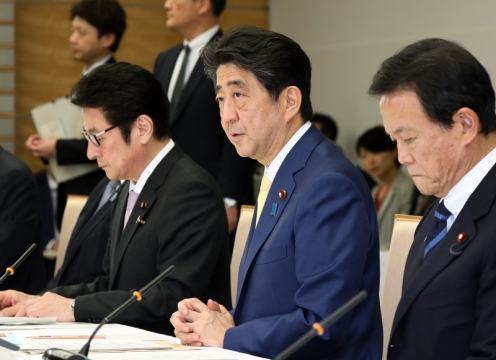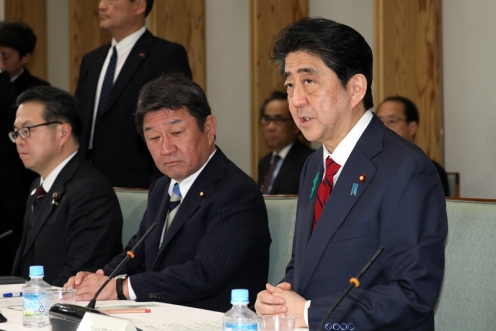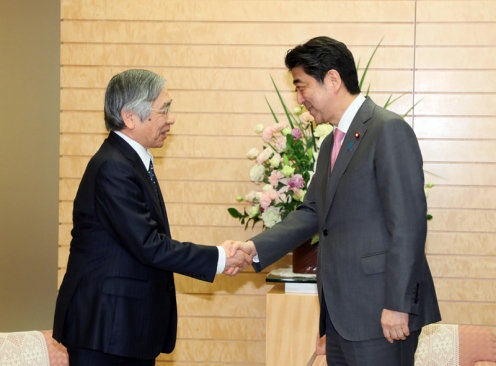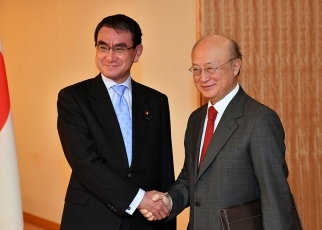Japan-Switzerland Summit Meeting and Other Events
Cabinet Secretariat, Thursday, April 12, 2018
[Provisional Translation]
On April 12, 2018, Prime Minister Shinzo Abe hosted a summit meeting and other events with H.E. Mr. Alain Berset, President and Head of the Federal Department of Home Affairs of the Swiss Confederation, at the Prime Minister’s Office.
The two leaders attended a salute and guard of honor ceremony, followed by a summit meeting. Thereafter, the leaders held a joint press announcement.
Japan-Bhutan Summit Meeting and Other Events
Cabinet Secretariat, Wednesday, April 11, 2018
[Provisional Translation]
On April 11, 2018, Prime Minister Shinzo Abe hosted a summit meeting and other events with H.E. Dasho Tshering Tobgay , Prime Minister of the Kingdom of Bhutan, at the Prime Minister’s Office.
The two leaders attended a salute and guard of honor ceremony, followed by a summit meeting. Thereafter, the leaders held a joint press announcement.
Lastly, the Prime Minister hosted a dinner banquet at the Prime Minister’s Official Residence, and said in his address,
“I am truly delighted to welcome Prime Minister Tobgay and his wife, who are important friends of Japan, to this country.
At the summit meeting held earlier today, Prime Minister Tobgay and I held a very extensive exchange of views. From now on, I would like you to relax and enjoy Japanese cuisine.
Japan and Bhutan share one of the warmest and most cordial relationships in the world. The peoples of the two countries share a bond of friendship. For instance, speaking for myself, I was told that Prime Minister Tobgay’s hobby is archery and, actually, I was a member of the archery club when I was a student. Currently, as I am serving as the President of the All Japan Archery Federation, I feel a strong sense of affinity with Prime Minister Tobgay. If we have the opportunity, I would certainly love to have an archery match with Prime Minister Tobgay. At the same time, however, since I am the President of the All Japan Archery Federation, I would like to refrain from revealing my true archery abilities.
The friendly relations between Japan and Bhutan have also been supported by the actions and dedication of the people of both countries. One such person was the late Dasho Keiji Nishioka, who worked tirelessly on agricultural development in Bhutan and earned trust with his dedication and sincerity. Mrs. Satoko Nishioka, who undertook this journey with him, is here with us this evening.
In the year of the Great East Japan Earthquake, their Majesties the King and Queen of Bhutan visited Japan, and encouraged many Japanese people including those in the areas affected by the disaster. Today, we are joined by Kasumi Goto and Kaito Abe, who were both elementary school students at the time of the disaster. They have both overcome the difficult time of the disaster and grown up to be splendid young people. The areas affected by the disaster are strongly recovering, and I would like Prime Minister Tobgay to see that for himself tomorrow.
We have invited to tonight’s banquet many people who have supported our wonderful friendship with Bhutan in various fields, including politics, the economy, academia, and culture.
It is thanks to all of your efforts that Japan and Bhutan share such an extremely amicable relationship today. I would like to take this opportunity to thank everyone once again, and request your continued contributions in the future.
I would now like to offer a toast to the good health of Prime Minister Tobgay, his wife, and everyone here today, and to the further development of the relationship between Japan and Bhutan.
Tashi delek! Cheers!”
Courtesy Call from a Delegation of Legislators Participating in the U.S.-Japan Legislative Exchange Program
Cabinet Secretariat, Friday, April 6, 2018
[Provisional Translation]
On April 6, 2018, Prime Minister Shinzo Abe received a courtesy call from a delegation of legislators participating in the U.S.-Japan Legislative Exchange Program at the Prime Minister's Office.
Tokyo Conference on Supporting Job Creation and Vocational Training to Facilitate Weapons Reduction for Iraqi Society
Cabinet Secretariat, Thursday, April 5, 2018
[Provisional Translation]
On April 5, 2018, Prime Minister Shinzo Abe attended the Tokyo Conference on Supporting Job Creation and Vocational Training to Facilitate Weapons Reduction for Iraqi Society.
Before attending the conference, Prime Minister Abe first held a talk with H.E. Dr. Haider Al-Abadi, Prime Minister of the Republic of Iraq.
The two leaders then attended the Tokyo Conference on Supporting Job Creation and Vocational Training to Facilitate Weapons Reduction for Iraqi Society.
The Prime Minister said in his opening address,
“I am honored to welcome all of you, including H.E. Dr. Haider Al-Abadi, Prime Minister of the Republic of Iraq, as well as representatives from various countries and international organizations, to today’s Tokyo Conference on Supporting Job Creation and Vocational Training to Facilitate Weapons Reduction for Iraqi Society.
I would like to begin by offering my heartfelt condolences to all of the victims of ISIL, or Daesh.
I would like to express my sincere respect for Prime Minister al-Abadi and ask that all of you join me in applauding him for his exceptional leadership in regaining control of all areas of Iraq once controlled by Daesh.
However, the fight has yet to end. We can only achieve true victory when we create a vibrant and secure Iraq that will never again tolerate the emergence of violent extremist organizations, after this military victory.
The international community has already begun working on reconstruction for Iraq in the aftermath of Daesh, including holding an international conference in Kuwait this February. Japan, too, is committed to continuing its support such as humanitarian and stabilization assistance as well as yen loans aiming at rebuilding infrastructure.
I have heard that the people of Iraq refer to Japan as “Kawkab Al Yaban” in Arabic, which means a country on a different planet than Iraq. I was told that this expression is praise for Japan for its recovery from the Second World War and creation of a peaceful society and prosperous economy. This makes me very happy to hear.
Japan will newly take the lead in supporting Iraq to achieve a more peaceful society. Development is needed for the improvement of public security and vice versa. I hereby call on the international community to support the initiatives of the Iraqi Government using a new approach that regards public security and development as a whole.
Specifically, we must provide the people of Iraq with opportunities to secure a peaceful livelihood, and through this encourage them to surrender weapons to the Government voluntarily. This will make it possible to make the country safer by reducing the number of weapons spread throughout Iraqi society as well as lowering the dependence on and demand for weapons.
To achieve this goal, in the beginning, we would like to draw on the wisdom of the countries and international organizations in attendance today and carry out the necessary studies and analyses. Then, we would also like to establish a working group to incorporate these findings into specific policies and examine frameworks for assistance, including appropriate funding mechanisms.
Japan will support the efforts of the Government and people of Iraq as they work to create an Iraq that can be called “Kawkab Al Iraq” by other countries, utilizing our experiences in domestic weapons control and international assistance, along with our knowledge and experience of post-war recovery.
It is my sincere hope that today’s conference will mark the beginning of Iraq becoming a new model for the international community as a country that has overcome the destruction and suffering caused by terrorism, become a peaceful society and prosperous economy, and succeeded in reconstruction.”
Japan-Iraq Foreign Ministers’ Meeting
Foreign Affairs, Thursday, April 5, 2018
On April 5, commencing at around 1 p.m. for approximately 50 minutes, Mr. Taro Kono, Minister for Foreign Affairs, held a meeting over lunch with H.E. Dr. Ibrahim Al-Jaafari, Foreign Minister of the Republic of Iraq. The overview of the meeting is as follows.
1. Bilateral relations
Minister Kono welcomed that the people of Iraq had come together to successfully defeat the Islamic State of Iraq and the Levant (ISIL) in Iraq. He expressed a view that the 80th anniversary of the establishment of diplomatic relations between the two countries next year will be a good opportunity to make a big leap in the bilateral relationship, and stated that he intended to strengthen the relationship through activities of Japanese private companies as a driving force.
In response, Minister Al-Jaafari stated that Japan’s cooperation is necessary to advance the reconstruction of Iraq, and he intended to work hard to create a stable security situation and a favorable investment environment.
2. Regional affairs
The two ministers exchanged views on the Middle East. Minister Al-Jaafari stated that Iraq would cooperate for resolving regional issues with Japan, which is trusted and respected by the regional countries and enjoys good relationship with all the countries including Iraq. In response, Minister Kono stated that Japan would continue to address the regional issues in cooperation with Iraq.
Courtesy Call from the Secretary-General of the OECD
Cabinet Secretariat, Thursday, April 12, 2018
[Provisional Translation]
On April 12, 2018, Prime Minister Shinzo Abe received a courtesy call from Mr. Angel Gurria, Secretary-General of the Organisation for Economic Co-operation and Development (OECD), at the Prime Minister’s Office.
Courtesy Call from the Hamburg Cherry Blossom Queen and Others
Cabinet Secretariat, Tuesday, April 10, 2018
[Provisional Translation]
On April 10, 2018, Prime Minister Shinzo Abe received a courtesy call from the Hamburg Cherry Blossom Queen, the Japan Cherry Blossom Queen, and others at the Prime Minister’s Office.
Courtesy Call from the Minister of National Defence of Viet Nam
Cabinet Secretariat, Tuesday, April 10, 2018
[Provisional Translation]
On April 10, 2018, Prime Minister Shinzo Abe received a courtesy call from H.E. General Ngo Xuan Lich, Minister of National Defence of the Socialist Republic of Viet Nam, at the Prime Minister’s Office.
Council for Science, Technology and Innovation
Cabinet Secretariat, Thursday, April 5, 2018
[Provisional Translation]
On April 5, 2018, Prime Minister Shinzo Abe held the 38th meeting of the Council for Science, Technology and Innovation at the Prime Minister’s Office.
During the meeting, there was a discussion for the planning of an integrated innovation strategy.
Based on the discussion, the Prime Minister said,
“It is essential that we fundamentally enhance public-private investment funding in order to make Japan a world leader in innovation.
We will strongly encourage collaborations between industry and academia and management reforms at universities, including introducing a funding system that allocates government funds by prioritizing universities that actively elicit investment from the private sector.
We will also enhance the mobility of researchers and create greater opportunities for young researchers to play active roles, by considering a mechanism to significantly expand the annual salary system. Furthermore, we will also usher in reforms for the allocation of research budgets so as to encourage young researchers to tackle bold and challenging projects in a stable research environment.
With respect to the execution of government budgets, it is necessary to create a framework for promoting innovation in government projects by actively utilizing innovative technologies in the government. Towards the realization of Society 5.0, one urgent challenge is the development of human resources. In the coming age, acquiring skills in information technology (IT) and information processing, such as artificial intelligence and big data, will become the equivalent of learning how to read, write and use an abacus.
In cooperation with the Council on Investments for the Future, we must implement comprehensive measures including education for the general public beyond the development of only top-level talent, so that we do not fall behind the pace of change.
To achieve this vision, I ask that Chief Cabinet Secretary Suga, Minister Matsuyama, and other relevant ministers study and implement concrete system designs and relevant measures.”
Meeting of the Council on Economic and Fiscal Policy
Cabinet Secretariat, Thursday, April 12, 2018
[Provisional Translation]
On April 12, 2018, Prime Minister Shinzo Abe held the 4th meeting in 2018 of the Council on Economic and Fiscal Policy at the Prime Minister's Office.
At the meeting, discussion took place on approaches to future reforms and priority issues for social security and social infrastructure development, two themes of the Integrated Economic and Fiscal Reforms.
Based on the discussion, the Prime Minister said,
“Today, we discussed approaches to future reforms and priority issues for social security and social infrastructure development, as specific items of the Integrated Economic and Fiscal Reforms.
Firstly, with regard to social security, which accounts for the major portion of our government finances, we must thoroughly review the direction of reforms to be implemented over the next three years, including the level of expenditure. In doing so, we will need to take into consideration the structural changes following 2022, when the baby boomer generation will begin to turn 75. I ask that relevant ministers carry out detailed reviews.
Secondly, regarding future social infrastructure development, we must work toward extending service life as well as achieving thorough streamlining and prioritization. Council members from the private sector pointed out that the execution of budgets by ministries and agencies concentrate on the end of the fiscal year. I ask that relevant ministers, including Minister Ishii, work on strengthening initiatives aimed at leveling out budget execution.”
Meeting with the Governor of the Bank of Japan
Cabinet Secretariat, Monday, April 9, 2018
[Provisional Translation]
On April 9, 2018, Prime Minister Shinzo Abe held a meeting at the Prime Minister's Office with Mr. Haruhiko Kuroda, Governor of the Bank of Japan, upon Mr. Kuroda’s reappointment as Governor.
Regional Economic Report (Summary) (Apr. 2018)
Bank of Japan, Thursday, April 12, 2018
This report summarizes the reports from all regional research divisions, mainly at the Bank's branches in Japan, and is based on data and other information gathered for the meeting of general managers of the Bank's branches held today. The English translation is based on the Japanese original.
According to assessments from regions across Japan, six regions (Hokuriku, Kanto-Koshinetsu, Tokai, Kinki, Chugoku, and Kyushu-Okinawa) reported that their economy had been expanding or expanding moderately, and three regions (Hokkaido, Tohoku, and Shikoku) noted that the economy had continued to recover moderately. These reports were based on the assessments that the virtuous cycle from income to spending had been maintained, as labor market conditions had continued to tighten steadily and private consumption had improved, while exports had been on an increasing trend with overseas economies growing firmly.
Compared with the previous assessment in January 2018, the Shikoku and Kyushu-Okinawa regions revised up their assessments based on the improvement in private consumption. On the other hand, the Hokkaido region revised down its assessment, due mainly to public investment having turned downward as construction orders related to restoration following the typhoon disaster in summer 2016 had come to a halt. Meanwhile, the other six regions reported that their assessments were unchanged.
Comparison of Previous and Current Assessments by Region
Hokkaido
The economy has been recovering moderately.
Tohoku
The economy has continued to recover moderately.
Hokuriku
The economy has been expanding.
Kanto-Koshinetsu
The economy has been expanding moderately.
Tokai
The economy has been expanding.
Kinki
The economy has been expanding moderately, with its growth becoming more solid.
Chugoku
The economy has been expanding moderately.
Shikoku
The economy has been recovering.
Kyushu-Okinawa
The economy has been expanding moderately, with its growth gaining a more solid footing.
Foreign Minister Taro Kono Meets with the Director General of the International Atomic Energy Agency
Foreign Affairs, Monday, April 9, 2018
On April 9, commencing at around 6:00 p.m. for approximately 20 minutes, Mr. Taro Kono, Minister for Foreign Affairs, held a meeting at the Ministry of Foreign Affairs with Mr. Yukiya Amano, Director General of the International Atomic Energy Agency (IAEA). The outline of the meeting is as follows.
1. Minister Kono and Director General Amano exchanged views on the situation of North Korea situation.
2. Minister Kono stated as follows; it is important to establish the stringent verification system by the IAEA for realizing complete, verifiable, and irreversible denuclearization of North Korea while North Korea allegedly shows its intention toward denuclearization; it is essential to make the most of the IAEA’s expertise and experience.
3. DG Amano explained about discussions with other countries and the measures of establishing the stringent verification system toward denuclearization of North Korea in light of the past experience of the IAEA.
4. Minister Kono agreed to continue close cooperation with the IAEA under DG Amano.
[Reference] (International Atomic Energy Agency (IAEA))
(1) The IAEA is an international organization established in 1957 for the purposes of promoting the peaceful uses of nuclear energy and preventing the diversion of nuclear energy for military purposes based on the Statute of the IAEA. (It currently has 169 Member States.)
(2) Director General Amano has held the post of Director General since December 2009 and is currently serving his third term. The General Conference of the IAEA approved his third term in September 2017.
The 47th Basic Survey on Overseas Business Activities (July 2017 Survey) Conducted
METI, Thursday, April 5, 2018
The Ministry of Economy, Trade and Industry (METI) annually conducts a Basic Survey on Overseas Business Activities, targeting business activities of overseas affiliates of Japanese companies (hereinafter referred to as “overseas affiliates”) and publicizes the compiled results. This survey aims to ascertain the current situation of overseas business activities of Japanese companies and the impact of such activities on partner countries and Japan. METI hereby announces that it compiled the results of the 47th survey and releases it.
The FY2016 trends in business of overseas affiliates are as follows.
The number of overseas affiliates was 24,959. The share in China decreased.
The number of employees hired in such affiliates was 5.59 million, up by 0.3% from the previous year.
The total sales of such affiliates were 257.6 trillion yen, down by 6.0% from the previous year.
The ratios of overseas production in the manufacturing industry (based on all domestic companies) were 23.8%, a decrease for the first time in five years.
Operating profits and net income of such affiliates reached a record-high.The total amount of capital investment by such affiliates in the manufacturing industry decreased. The ratios of overseas capital investment also decreased.
1. Summary of findings
(1) The ratio of overseas affiliates in China to the total such affiliate oversees has been decreasing.
The total number of overseas affiliates as of the end of FY2016 was 24,959 of which 10,919 were in the manufacturing industry and 14,040 were in non-manufacturing industry.
Looking at the ratios of overseas affiliates in Asia (66.2% of all such affiliates are running business) to all such affiliates, those in China showed a decrease of 30.2%, while those in ASEAN-4 economies and other Asian regions (for e.g., Viet Nam), showed an increase of 18.1% and 6.7%, respectively.
(2) The number of employees in overseas affiliates grew.
The number of employees in overseas affiliates as of the end of FY2016 was 5.59 million, showing an increase by 0.3% from the previous year, and those of such affiliates that have responded in both 2016 and 2017 also showed an increase of 2.0% from the previous year.
By industry, 4.33 million were in the manufacturing industry, showing a decrease of 2.1% from the previous year, while 1.26 million were in non-manufacturing industries, showing an increase by 9.3% from the previous year.
By region, an increase was seen from the previous year in North America at 0.73 million, up by 6.8%, and in Europe at 0.55 million, up by 0.5%, while a decrease was seen in Asia at 3.94 million, down by 1.4%, in particular, in China at 1.57 million, down by 3.0%, and ASEAN-4 economies at 1.41 million, down by 2.2% from the previous year.
(3) The total sales of overseas affiliates decreased.
The total sales of overseas affiliates were 257.6 trillion yen, down by 6.0% from the previous year, and those of such affiliates that have responded in both 2016 and 2017 also decreased by 6.0% from the previous year.
Looking at the total sales by type of industry, a decrease was seen in most of industries, including the transportation equipment, information and communication electronics equipment, and wholesale industries.
Looking at such sales by region, a decrease was also seen in all of Asia, North America, and Europe.
(4)The ratios of overseas production in the manufacturing industry declined.
The ratios of overseas production in the manufacturing industry (based on all domestic companies) were 23.8%, down by 1.5 percentage points from the previous year, showing a decrease for the first time in five years.
Looking at the ratios by type of industry, a decrease is seen in some industries, including transportation equipment at 46.1%, general-purpose machinery at 32.9% and information and communication electronics equipment at 27.3%.
(5) Operating profits and net income of overseas affiliates reached a record-high level.
Operating profits of overseas affiliates were 12.2 trillion yen, up by 26.9% from the previous year, and those of such affiliates that have responded in both 2016 and 2017 also increased by 14.6% from the previous year, both of which reached a record-high level.
Net income of overseas affiliates was 9.0 trillion yen, up by 37.9% from the previous year, and those of such affiliates that have responded in both 2016 and 2017 also increased by 27.0% from the previous year, both of which reached a record-high level.
Retained earnings in FY2016 were 4.3 trillion yen, up by 114.5% from the previous year, while the retained earnings balance was 33.7 trillion yen, up by 5.2% from the previous year, both of which showed an increase.
(6) The total amount of capital investment in the manufacturing industry decreased. The ratio of overseas capital investment to the total such investment in the industry also decreased.
The total amount of capital investment by overseas affiliates in the manufacturing industry was 3.8 trillion yen, down by 17.6% from the previous year, while that of such affiliates that have responded in both 2016 and 2017 in the industry also decreased by 21.4% from the previous year.
Looking at the total amount of capital investment by industry type, a decrease was seen in some industries, including the transportation equipment and chemicals industries.
Looking at such amount by region, a decrease was also seen in all regions, i.e. in Asia, North America, and Europe.
The ratio of overseas capital investment to the total investment by overseas affiliates were 20.7%, showing a decrease by 4.8 percentage points from the previous year.
2. Outline of the survey
(1) Purpose
The survey aims to uncover the current situation of overseas business activities of Japanese companies, thereby obtaining basic data to contribute to the planning, preparation and implementation of a variety of measures.
(2) Targets of the survey
The survey targeted Japanese companies having overseas affiliates (hereinafter referred to as the “headquarters”) as of the end of March 2017. These companies exclude those in the finance and insurance, and real estate industries. The term “overseas affiliates” in the survey is a collective term referring to overseas affiliates and second-tier affiliates operated by the headquarters that satisfy the following requirements:
The term “overseas affiliates” refers to an overseas corporation in which a Japanese company has been investing at a ratio of over 10%.
The term “second-tier affiliates” refers to an overseas corporation in which an overseas subsidiary company with a Japanese capital contribution at a ratio of over 50% has been investing at a ratio of over 50%.
(3) How to conduct the survey
METI conducts written surveys, in which it distributes two types of questionnaire sheets (those for the headquarters and those for overseas affiliates) to the headquarters and the headquarters sends the completed sheets back to METI.
(4) Timing of achievements uncovered in the survey
METI conducted the survey on July 1, 2017, targeting responding companies’ achievements [i] as of the end of March 2017 or the timing before this month and closest to the closing date of financial accounts in FY2016 and [ii] at the end of FY2016.
(5) Data on collection of questionnaire sheets
Collection ratio: 74.1%
Number of target companies that operating business: Headquarters: 6,523, overseas affiliates: 24,959
(6) Note to data users
METI adopted the Japanese Yen, in principle, as the currency unit in aggregating data on the related items of the survey targeting overseas affiliates, and converted the yen to local currencies using the average exchange rate (period average) under the International Financial Statistics (IFS) released by the International Monetary Fund (IMF).
Please note that changes in yen value to local currencies are seen depending on survey years if the rates of the yen to the local currency in the country where a target overseas subsidiary operates business are compared between the target year and the previous year. For example, as for the Japanese yen rate against the US dollar, the exchange rate was 108.79 yen/dollar in the 2017 survey, showing an appreciation of the yen by 10.1% from the previous survey (121.04 yen/dollar), and as for the Japanese yen rate against the Euro, the exchange rate was 120.88 yen/Euro in the 2017 survey, showing an appreciation of the yen by 10.1% from the previous survey (134.49 yen/Euro).
Korea's Anti-Dumping Duties on Pneumatic Valves From Japan Inconsistent with WTO Agreement
METI, Thursday, April 12, 2018
On April 12, 2018, the World Trade Organization (WTO) circulated a panel report regarding the Republic of Korea (ROK)’s measure of imposing anti-dumping duties on valves for pneumatic transmission (pneumatic valves) from Japan, a matter that has been examined by the WTO at the request of Japan. The report presents a ruling, upholding Japan’s claims, that the ROK’s measure imposing anti-dumping duties on the product in question is inconsistent with the Agreement on Implementation of Article VI of the General Agreement on Tariffs and Trade 1994 (Anti-Dumping Agreement) due to defects in determination of injury and a causal relationship as well as in transparency in its investigation procedure. The panel recommends that the ROK should bring its measure into conformity with the Anti-Dumping Agreement.
1. Outline
On March 15, 2016, Japan requested the establishment of a panel under the WTO Agreement regarding the ROK’s measure imposing anti-dumping duties on pneumatic valves from Japan, and on July 4, 2016, a panel under the WTO Agreement was established.
Japan claimed that the ROK’s imposition of anti-dumping duties is inconsistent with the Anti-Dumping Agreement due to defects in the determination of injury and a causal relationship as well as in transparency in its investigation procedure.
Following this, the panel meetings (oral hearings) were held in March and May 2017. The WTO finally circulated a panel report that presents a ruling that the ROK’s measure imposing anti-dumping duties on the product in question is inconsistent with the Anti-Dumping Agreement due to defects in determination of injury and a causal relationship as well as in transparency in its investigation procedure. The panel requests that the ROK bring its measure into conformity with the Anti-Dumping Agreement.
2. Details of the decision
The report presents that the ROK’s imposition of anti-dumping duties is inconsistent with the Anti-Dumping Agreement, and recommends that ROK should bring its measures into conformity with that Agreement, showing the ruling as below:
(1) The ROK’s decision to impose anti-dumping duties is inconsistent with Articles 3.1 and 3.5 of the Anti-Dumping Agreement due to defects in the determination of injury to the ROK’s domestic industry and a causal relationship between such an injury and the dumped imports from Japan.
(2) The ROK’s decision is also inconsistent with Articles 6.5 and 6.5.1 of the Anti-Dumping Agreement due to defects in the investigation procedure, i.e., in handling of confidential information.
(3) Some of Japan’s claims, including those regarding the interpretation of Articles 3.1, 3.2 and 3.4 of the Anti-Dumping Agreement are not accepted or not decided on since the issue is outside the terms of reference of the panel.
3. Future schedule
Parties concerned may appeal to the WTO Appellate Body within 60 days from the release of the panel report. If no appeal is filed, the panel’s decision in the report will become the WTO’s final decision.

























